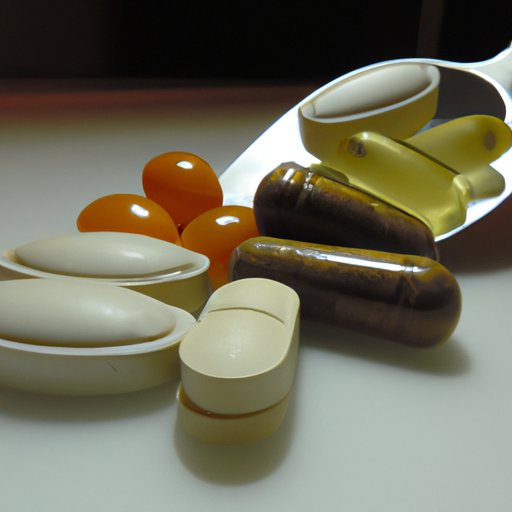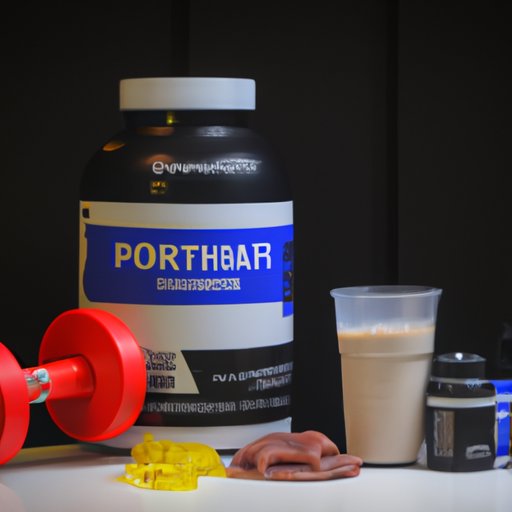Introduction
If you’re looking to build muscle, you need to make sure you’re eating right. But what should you eat? Eating the right foods can help fuel your workouts, maximize your gains, and ensure that you’re getting all the nutrients your body needs. In this article, we’ll explore what to eat when working out to build muscle, including protein-rich foods, carbohydrates, healthy fats, creatine, essential vitamins and minerals, and staying hydrated.
Eating Protein-Rich Foods to Fuel Muscle Growth
Protein is an essential macronutrient for building muscle. It’s made up of amino acids that are used to repair muscle fibers after a workout. When you work out, your muscles are broken down and then repaired with proteins, resulting in increased muscle size and strength over time. Without enough protein in your diet, it can be difficult to build muscle.
There are many sources of protein, including lean meats, seafood, eggs, dairy products, beans, nuts, and seeds. Plant-based proteins such as tofu, tempeh, and quinoa are also good options. Protein powders such as whey or plant-based powders can be used to supplement your diet if needed.
The American College of Sports Medicine recommends that adults who are trying to build muscle consume 1.2 to 2.0 grams of protein per kilogram of body weight per day. For example, if you weigh 70 kilograms (154 pounds), you would need 84-140 grams of protein per day.

Timing Your Meals Around Workouts
It’s important to time your meals around your workouts to maximize muscle growth. Before you work out, you want to eat a meal that will provide energy and prevent fatigue during your workout. A pre-workout meal should include complex carbohydrates, protein, and healthy fats. Good pre-workout meal options include oatmeal with nuts and seeds, a banana and nut butter, yogurt with fruit and nuts, or a smoothie with protein powder.
After your workout, you want to replenish your energy stores and repair your muscles. A post-workout meal should include a combination of carbohydrates and protein. Good post-workout meal options include chicken and brown rice, salmon and sweet potatoes, or a protein shake with fruit and almond milk.
Knowing Which Carbs to Choose for Energy
Carbohydrates are an important source of energy for your workouts. They’re broken down into glucose, which your body uses for fuel during exercise. There are two types of carbohydrates: simple and complex. Simple carbohydrates are found in sugary foods such as candy, cookies, and soda. Complex carbohydrates are found in whole grains, fruits, and vegetables.
The glycemic index is a measure of how quickly a food is digested and how it affects your blood sugar levels. Foods with a high glycemic index are quickly digested and cause a spike in blood sugar. Foods with a low glycemic index are slowly digested and don’t cause a spike in blood sugar. When working out to build muscle, it’s best to choose complex carbohydrates with a low glycemic index.
The Dietary Guidelines for Americans recommend that adults consume 45%-65% of their total calories from carbohydrates. This works out to about 225-325 grams of carbohydrates per day for someone on a 2,000 calorie diet.

Understanding the Role of Healthy Fats in Building Muscle
Healthy fats are an important part of a balanced diet. They provide essential fatty acids, which are necessary for the absorption of fat-soluble vitamins and the production of hormones. Healthy fats also provide energy and help keep you full between meals. Good sources of healthy fats include avocados, olive oil, nuts, and fatty fish such as salmon.
The Dietary Guidelines for Americans recommend that adults consume 20%-35% of their total calories from fat. This works out to about 44-78 grams of fat per day for someone on a 2,000 calorie diet.
Incorporating Creatine Into Your Diet
Creatine is a naturally occurring compound found in the body. It’s stored in the muscles and used for energy during high-intensity exercise. Studies have shown that taking creatine supplements can increase muscle mass, strength, and power. It can also improve recovery time between workouts.
Creatine is found in red meat and fish, but you can also take it in supplement form. The recommended daily dose is 3-5 grams per day, taken before or after a workout.

Supplementing With Essential Vitamins and Minerals
Vitamins and minerals are essential for overall health and performance. They’re involved in many processes in the body, including energy production, muscle contraction, and immune function. Good sources of vitamins and minerals include fruits, vegetables, nuts, and whole grains. You can also take a multivitamin supplement to make sure you’re getting all the vitamins and minerals you need.
The Recommended Dietary Allowance (RDA) for vitamins and minerals varies depending on age and gender. Generally, adults should aim to get at least 400 micrograms of folate, 600 IU of vitamin D, 15 milligrams of zinc, and 1.1 milligrams of iron per day.
Staying Hydrated for Optimal Performance
Staying hydrated is essential for optimal performance. Dehydration can lead to fatigue, reduced endurance, and impaired cognitive function. The Institute of Medicine recommends that men consume about 3 liters (13 cups) of fluid per day, and women consume about 2.2 liters (9 cups) of fluid per day.
Water is the best choice for hydration, but you can also get fluids from other beverages such as sports drinks, juices, and herbal teas. Aim to drink fluids throughout the day, especially before, during, and after exercise.
Conclusion
When working out to build muscle, it’s important to eat a balanced diet that includes protein, carbohydrates, healthy fats, and essential vitamins and minerals. Timing your meals around your workouts can also help maximize your gains. Additionally, staying hydrated is essential for optimal performance. Following these guidelines can help ensure that you’re getting all the nutrients your body needs to reach your fitness goals.
(Note: Is this article not meeting your expectations? Do you have knowledge or insights to share? Unlock new opportunities and expand your reach by joining our authors team. Click Registration to join us and share your expertise with our readers.)
